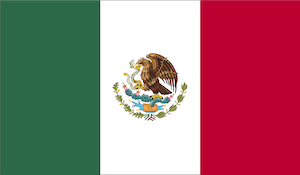
10 Things to Do: Yucatán Peninsula
Mexico’s Yucatán Peninsula, also called the Mayan Riviera, is home to extraordinary pre-Columbian ruins and stunning beaches. Spanning three Mexican states and parts of Belize and Guatemala, the Yucatán is also turning into one of the premiere music and nightlife meccas. All prices are in U.S. dollars.— Wilda Escarfuller 1. Climb a pyramid. The Chichén … Read more
Monday Memo: Haitian Immigrants – Venezuelan Currency Losses – Abortion in Chile – Iguala Relatives in Geneva – Puerto Rico’s Economy
Likely top stories this week: the deadline passes for children of undocumented immigrants to apply for legal status in the Dominican Republic; U.S. companies stand to lose billions of dollars in Venezuelan currency losses; Michelle Bachelet moves to end Chile’s abortion ban; relatives of Mexico’s 43 missing students meet with UN officials in Geneva; Puerto … Read more

Mexico After Ayotzinapa: Ya Me Cansé, Por Eso Propongo
Translated by Paulina Suárez-Hesketh The Ayotzinapa case (in which 43 students were disappeared by local government forces in the city of Iguala, Mexico) has galvanized an unexpected amount of social energy in Mexico. The healthy civic agitation that followed the case, along with the countless expressions of protest and dissatisfaction, reveal the desires of a … Read more
Mexico Confirms Deaths of 43 Students
Mexican officials confirmed on Tuesday that the 43 students who disappeared in the southern state of Guerrero on September 26 are dead. Citing confessions and forensic evidence, Attorney General Jesus Murillo Karam concluded that the group of students was murdered and incinerated by a local gang who mistook the students for a rival gang. The … Read more
Monday Memo: Venezuela Protests – Haiti Elections – Caribbean Energy – AT&T – Brazil Olympics
This week’s likely top stories: Venezuelan opposition leaders halt protests in Caracas; Haiti swears in its nine-member Provisional Electoral Council; the U.S. hosts the first-ever Caribbean Energy Security Summit; AT&T acquires Nextel Mexico; Rio’s environment secretary announces that Guanabara Bay will not be clean in time for the 2016 Olympic Games. Opposition Curbs Protests in … Read more
Mexican Defense Ministry Implicated in Illegal Arms Sales
According to reports in German and Mexican news media, Mexico’s Secretaría de la Defensa Nacional (Secretariat of National Defense—SEDENA) has been implicated in the illegal sale of German arms in the Mexican state of Guerrero, in cooperation with a representative from German arms manufacturer Heckler & Koch. Guerrero is one of four Mexican states to … Read more
New Study Ranks Democracy in Latin America
Only two countries in Latin America—Costa Rica and Uruguay—can be considered “full democracies,” according to an Economist Intelligence Unit (EIU) study commissioned by BBC for Democracy Day on January 20. The report says that a majority of Latin American countries hold “free and fair” elections and are better ranked than their counterparts in the Middle … Read more
Protesters Attempt to Enter Army Base in Mexico
Protesters and family members of the 43 student protesters who disappeared last September in Iguala, Mexico tried to enter an army base in Iguala on Monday. The families of the missing students and their supporters allege that the Mexican government has failed to examine the role of the military in the tragedy. Participants in the … Read more
Monday Memo: Haiti Deadlock – Cuba Prisoners – PEMEX – U.S. Gay Marriage – China and CELAC
This week’s likely top stories: Haiti attempts to negotiate its way out of political deadlock; Cuba frees 53 political prisoners, holding up its end of the rapprochement deal with U.S.; Mexico cuts funding to PEMEX causing major oil sector layoffs; the U.S. Supreme court declines to review a challenge to Louisiana’s gay marriage ban; China … Read more
U.S.-Mexico Relations: The Gifts of Three Kings?
More than Christmas, Three Kings Day on Tuesday was the holiday to celebrate if you come from Latin America. Starting in Mexico and going south, the holiday—the Dia de los Reyes Magos—commemorates the New Testament story in Matthew that describes the visit of three wise men to Bethlehem to see the newborn baby Jesus. Each … Read more
Mexican Police Officers Investigated Over Disappeared Journalist
Thirteen police officers in the Mexican city of Medellín de Bravo in the state of Veracruz were detained on Thursday as part of the investigation into the kidnapping of the journalist Moisés Sánchez Cerezo. Sánchez Cerezo, the director and editor of the small, local publication La Unión, was abducted last Friday, January 2 by unidentified … Read more

Policy Updates
A snapshot of policy trends and successes in the region.
Peña Nieto’s Plan to Tackle Economic Inequality
Mexican President Peña Nieto laid out his ten point plan to tackle injustice and corruption in the country last month as part of his response to the murder of 43 students in Iguala, Mexico. Although the plan has been derided for lacking true punch and political support, one less discussed, but significant, piece of the … Read more
What connects Iguala, Ferguson and New York City?
It has been almost half a century since the world last thought of American cities as conflict zones. But starting this past August, events in Ferguson, Missouri, changed that rapidly. The appearance of armed personnel carriers, Humvees and other military equipment reveal to Americans—and the world—that U.S. cities are indeed the new war zones. A … Read more
Monday Memo: Brazil Petrobras — Haiti Protests — LatAm Currencies — Guantánamo Prisoners —Mexico Missing Students
This week’s likely top stories: Brazilian prosecutor plans to indict at least 11 in the Petrobras scandal; Haitian protestors in Port-au-Prince demand long-overdue elections; Latin American currencies drop as U.S. job growth surges in November; U.S. releases six Guantánamo prisoners to Uruguay; Meixcan government identifies the remains of one of 43 missing students. Brazilian Prosecutor … Read more



